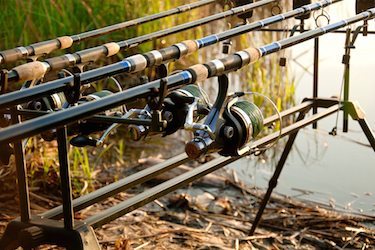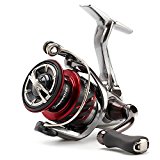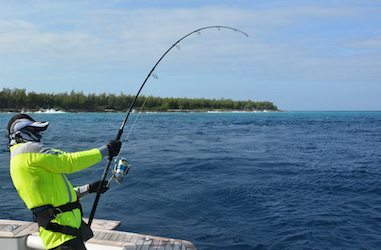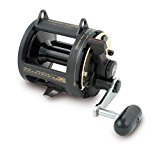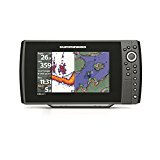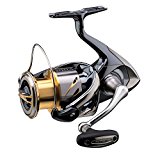How to Choose the Best Fishing Reels and When to Use Them
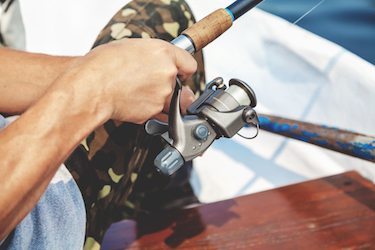
The simplest definition of a reel is that it’s a device around which a material is wound. In terms of fishing, it provides the control over the line and is responsible for landing a fish once it’s struck the lure.
Which are the best fishing reels?
Most bass anglers opt for either a spincasting or a baitcasting reel. Some prefer a front drag while others prefer a rear drag reel. It’s not important which one is best, but rather which reel is best for you, most of the time, and best suited to the fish you want to catch.
Click on the links to find the benefits and disadvantages of each reel.
Baitcasting Reels
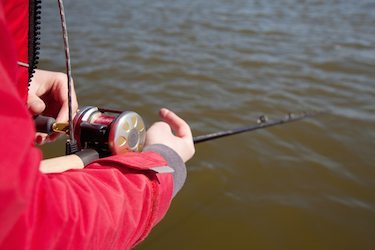 These are by far the most popular reels and baitcasting reels are considered the standard for catching bass.
These are by far the most popular reels and baitcasting reels are considered the standard for catching bass.Baitcaster advantages are
- they can easily manage heavy test lines
- that the reel can handle a lot of stress
- that the use of the bail allows more control of the lure and the overall placement of the reel on the rod.
The disadvantages are
- that these reels are highly susceptible to backlash
- there are a lot of parts to clean
These aren’t deal breakers though and you can overcome them. Here’s how:
- only fill the spool to the halfway mark. There’s good reason for doing this. It’s because a full spool will spin faster and longer and spinning too long will cause backlashes.
How to use a baitcaster reel
The trickiest thing to get down is how to use your thumb. Your thumb rides and guides the line and is instrumental in holding back the bail on casting. For those unfamiliar with the baitcasting reel, it will take a few outings to get used to it.
The best way to practice is find an open field and equip the line with a sinker and practice casting and retrieval.
Regardless of the strength of the reel, it’s their purpose that matters most.
Note: Baitcasters are designed for lake fishing, especially for species like bass.
Maintenance
Fly Reels
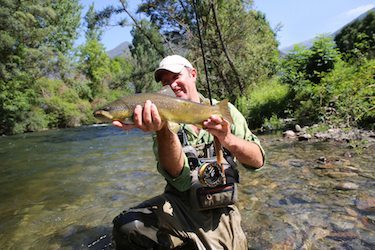 The best fly fishing reels will have a better rate of retrieve due to the larger reels as one crank retrieves more line.
The best fly fishing reels will have a better rate of retrieve due to the larger reels as one crank retrieves more line.
However a multiplying fly fishing reel is built to turn the spool 2 times every crank. If fast retrieval is important to you, go with a multiplying reel.
Note: Increasing the diameter of the line increases its odds of being coiled. As larger reels turn more slowly than a smaller one, it’s easier to control.
When you hook a large fish, the reel will keep you from losing it. The question is ‘which reel is right for you most of the time?’
Experienced anglers are often switching out one line type for another depending on the fish they want to catch. Instead of reeling out the existing line and putting on a new one, they’ll keep several reels handy. This saves a lot of time out on a fishing trip.
What can you expect for your money?
- High quality fly reels last a lifetime.
- A good quality fly reel won’t last as long, but will survive 5 years plus at a lower cost.
- A low quality reel, under US$50, is perfect for fishing small watersheds for small panfish and trout.
High quality fly fishing reels will cost over US$200. Don’t spend this much on a reel unless you know what you need from the reel.
Maintenance
Strength and durability are not the only aspects of a reel. The quality of the reel finish is important as it dictates whether it will resist corrosion.
When saltwater fly fishing, choose at least a good quality reel as the low end models have a thin layer of protection which salt and sun will quickly destroy.
Clean you reel after every use, especially in saltwater conditions. And like regular maintenance on a car, clean and grease the reel after a few months. High quality reels will only last a lifetime if they are cared for.
Ice Fishing Reels
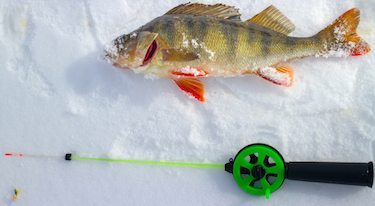 The best reel for ice fishing is an ultralight reel.
The best reel for ice fishing is an ultralight reel.
It’s size and shape will complement the rod and allow the line to run true through the rod guides.
When ice fishing, balance is critical. Everything from the rod to the line is about ultra-light gear. The rod, line and reel must compliment each other along with the lures.
Maintenance
Tip: Before embarking on your first ice fishing trip of the year, grease up the reel with a cold weather lube.
Front Drag Spinning Reel
This reel is excellent for catching many lake game fish such as bass, trout and white fish. And it works equally as well for fishing in streams and rivers.
Some anglers will argue that front drag is better than rear drag reels, but assuming that the construction and materials are equal on both, it’s a matter of preference as to which reel is better for a given angler.
However with that being said, there’s some empirical evidence suggesting that front drag reels have fewer problems.
These are the advantages:
-
front drag reels are less likely to lock up
- they’re easier to repair than rear drag reels
- the front drag system uses larger washers and will dissipate heat better with a heavy load
In a front drag configuration, the release switch is located on the back of the reel. In most rear drag reels, this switch is located on the bottom of the reel.
Even with these advantages, selecting a front drag reel over a rear drag reel is essentially a matter of your preference.
If you’re looking for a suggestion, the Shimano Stradic front drag would be a good choice and reviews well.
Spinning Reel – Free Spool
The term free spool reel is more about describing a feature rather than a specific reel type as many different types of reels now incorporate this technology in their high quality products, rather than low end reels.
The principle behind the free spool reel is popular with offshore fishing. Unlike other reels, the handle remains motionless during casting and the gears then engage when reeling in the line.
Some reels disengage the gears when casting. As you can imagine the fish on a strike just pull out the line until the gears are reinstated. Most new free spool reels don’t do this anymore.
Advantages:
- Free spool reels are free running and there’s little resistance to overcome. They can be taken apart easily as the mechanism is located in the head of the reel.
- For those who frequently suffer from backlash, consider using a free spool reel as it has an anti-backlash device that’s considered superior, by many angling authorities, than devices that work on friction.
Cleaning and maintenance is the same as other baitcasting reels.
Interested in a spinning reel?
Click here to find out more and read reviews for The Shimano Stradio FK Spinning Reel
Rear Drag Spinning Reels
Rear drag reels are less reliable than front drag reels. The rear drag applies pressure on a small diameter drive shaft.
So why have we included them?
The advantage is that rear drag reels are easier to adjust when fighting a fish.
How to reel in a fish with a rear drag
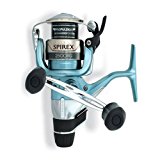 Keep the rod tip high and keep watching the line or fish while your left hand can feel for the drag in the rear.
Keep the rod tip high and keep watching the line or fish while your left hand can feel for the drag in the rear.
Use the drag system while working a lure.
The moment the hook is set, try disengaging the drag system.
When the fish lunges, pull the reel backwards.
Find the best prices and reviews here for the Shimano Spirex rear drag
Sea Fishing Reels
Sea bound reels are built stronger and more durable than inland based reels. However quality of the reel is always an important factor. Due to the cost of outings and the gear involved, don’t cheap out on the rod.
There are many varieties of saltwater fishing reels.
The multiplier type of reel is located on top of the rod. The reel’s clutch allows you to turn the reel up to 5 times with a single turn of the handle.
Know the fish you want to catch and select a reel appropriate for the toughest fight.
Remember it’s all about balance
The most affordable item in the system of rod, reel and tackle can mean the difference between landing a large marlin and going home empty handed.
Note: The star-drag mechanism in the Penn Senator reels would often overheat and need cooling. It’s common for these reels to produce heat from the friction and all modern reels have solved this overheating problem.
A level is incorporated in modern reels that increases to reduce friction and they have graphite plates to dissipate heat.


